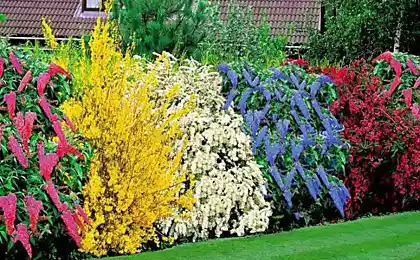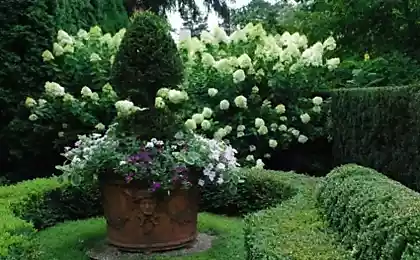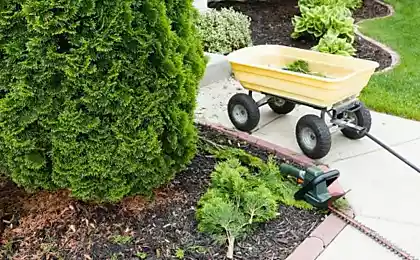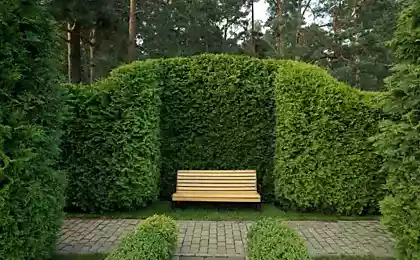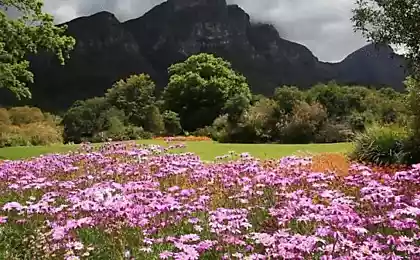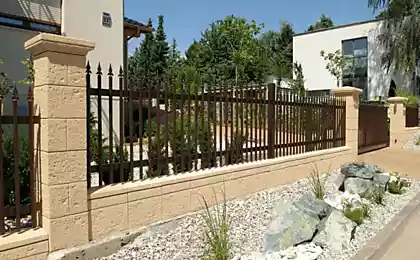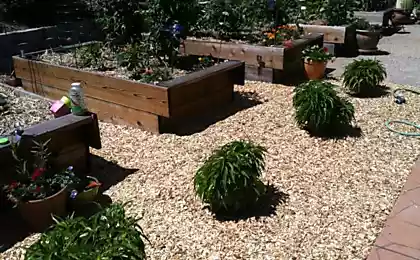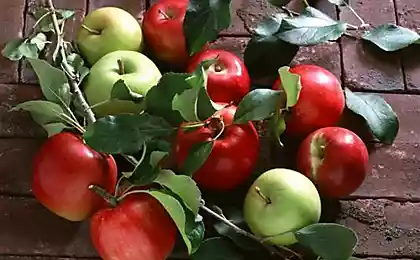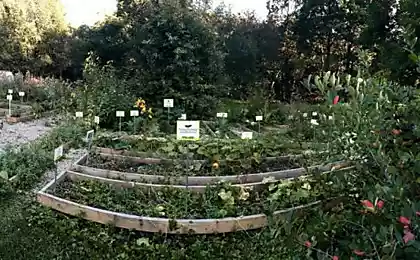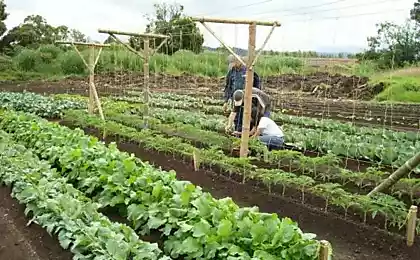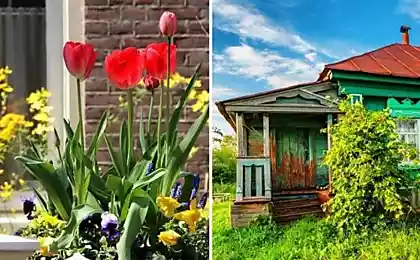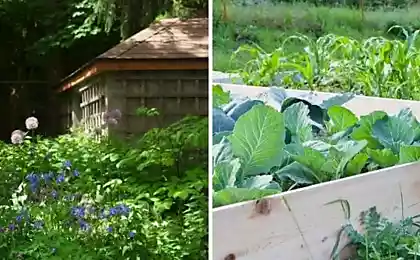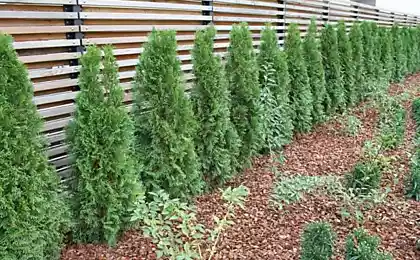565
Wise tips for choosing a place under the house
There is an interesting ancient document under the name "Naziratel" Dating back to the 16th century.The book gives practical tips on choosing the place under the house, described the intricacies of construction materials, farming, field, garden, vegetable crops, cultivation of arable land, garden, garden, vineyard.
A few excerpts from the book:
1. Guidelines for choosing locations for settlements:
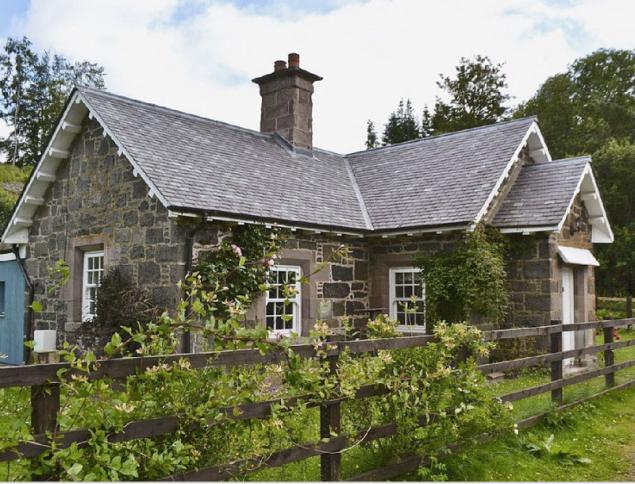
From the source:
"...various are the signs of life in the place, tells about the uplands and the lowlands and on the composition of the soil, namely: will it bog, calcareous or acidic, or filled with different ores; and the abundance, inadequacy or smallness of the waters, and on the composition of the substances in that water and that from it is born: trees, orchards, springs and other like things that are different to those under the mountains if they have the sea or the large rivers, and if there are low places gullies or some of the stench".
2. Recommendations for the treatment of the terrain:
From the source:
"...every yard ought to put that on your plot have water, and if no nearby water flowing, you should dig a well, and not drying up pond, for a well to the right people, and the pond animals. And how must take care to put the house on the hill with forest and meadow and good to healthy winds, it blew; so you need to consider that the house was open on the Sunny sunrise: summer will be cool in the shade, and in winter, illuminated by the sun.
And happen to put the barn at the river skotinku and other household needs, look diligently, and remember: do not put it close to the water, because the winter is extra cold will be there, and in summer the air is not very healthy, because of the dampness close to the river; provide that wasn't there swamps in the summer because the water dries out of them, and the people of worms, so small that the eye will not see them, but the air in the nose and nostrils of people and cattle puts them, they enter inside, causing diseases, and various ills.
Still need to beware, the house is not put there where there may be strong wind, so it is best in the mountain down to the valley to stake, and not on the mountain itself, not in the valley and certainly not in a dark ravine, but in place of this, where the house blew healthy air and cleans everything so that no trouble; I had rather a place where the sun is all day, because then the worms if they are born and unhealthy dampness spread, the wind will carry them away, and the sun's heat will destroy and dry.
The rain also large, the floods, and harmful to those who put the yards and homes in the valley, and from thieves calmer and safer place is high. Stables and barns oxen and other cattle should be put in the yards to be had in winter they are warm and quiet, and barns to be put on level ground to keep them filled with beer, wine, and oil, and on the shelves of the vegetables and crackers, grain and various seeds and other things which need to be stored for long periods, gradually taking on life.
... Taking into account everything said, you should pick up and place for arable land, so it was close to the court and bring as much profit; and the fields only need to have enough power to plow Yes remove".
Another interesting excerpt on the subject from the source:
"If you want to have a fertile field, give up the flat field, from which the water does not flow, but rather should; but it should not be on too steep a slope to drain everything without leaving the water; nor should it be in the valley (it remains water) and on the hills (to excess winds and heat do not harm her). Between these extremes there is a middle useful, and should be preferred: the field should be spacious and with a slight slope, or hilly in the middle with sloping sides down, so as not to stagnate the air got stale. Or let it be a field on the hill in front of a mountain that protects the earth from strong wind so that the field on the lower mountain was covered with or a steep mountain, or trees. Want to choose the field in the country cold gentle slope it should be against the sun or the South, to those parties not obscured sun or mountain or something like that, why the field such always stood in the shadows. In very hot countries it is better to choose the field that lies to the West or North, that is, the sloping part of the shade to protect from the sun; this will be more useful, healthier, and better."
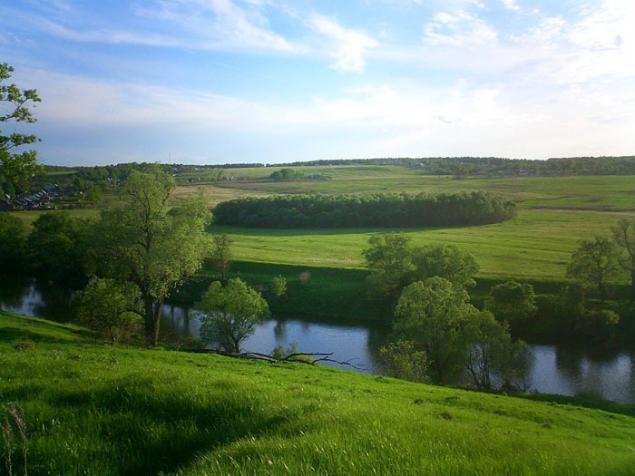
3. Recommendations on socio-economic situation and even the compatibility of the plantings with those of the neighbors:
From the source:
"...in addition to the soil indirectly need four more things to consider, selecting the field — whether she is fertile or completely useless.
Firstly, such land should not harm your enemies, for let it be fruitful, but would not be good, if the foe often spoils her.
Second, that the city was close and you could sell the surplus of their harvest, buy goods necessary to you. Third — if your home is away from the harvest and you can't quickly get there so need to take this field completely useless.
Fourth — between the house and the field need a convenient journey to different converged there roads where you can drive carts (or vessels with water), and that could get you to take things from people passing by.
There is another important thing for business use: see what quality and treatment fields your neighbors, among whom I live, for example, if your neighbor next to me owns an oak forest, know that there is definitely not you'll be able to plant olive trees, because trees have incompatibility: the other one you can't stand, and if there are, then are deflected away from each other. So the border with the neighbor sometimes turns the estate into a barren, especially if you grow it the olive trees and vines, and other plants too."
4. Guidelines for creating hedges,including those living around the orchards, gardens and fields, as well as understanding the necessary balance of moisture and air in soil in regions with abundant rainfall and a large catchment area.
From the source:
"Garden tiny and garden, and hail the fence are different, because someone ditch their ditches, someone is twisting around the fence to the stakes with brushwood, while others will plant around with the thorns of prickly shrubs or other trees by encircling ditches.All this is well guarded by lasagna men and wild beasts, and the excess water drained from neighboring fields and damaging crops, otherwise without these ditches Zapruder there moisture fields, it will no longer draining and staying on the field, the bread will hurt, developing a weed; in gardens it hinders growth, dehydrating and oxidizing a berry that ripens and remains acidic. Ditches are to be dig wider or narrower, depending on how many escapes of water; they are protected from people, from animals, from the harmful cattle. And to make them better in the summer when the water will dry up in the ground and in the ditches, because it can hinder the work: in the month of August, in September or October, when the land is most dry."
5. Advice on finding water:
From the source:
"...who wants to place some water find, get out before sunrise and on the ground legsi, Astelit beard on the ground and looks at the sun and see the light earth, outgoing, twinkling before the eyes, a vapour, like mist or spray of dew, then at least the place was dry, a sure thing, what's under the shallow ground water;
and if someone wanted to know if there is a lot or little water, judge the earth, because the earth is chalky, Yes lime is of a lot of water waste, the sand holds very little water, besides unsweetened, silt and the underlying;
in black soil the same springs and sources of little — and only from moisture that remains after rain and snow, but this water is good; Yes sandy clay silty ground, a lot of water gives the best, on the rocky soil are also good a lot of water, you need to ensure that she didn't run away between the stones in the gap;
on the rocky mountains are in abundance, ice cold and healthy water, on a level with the same field of the heavy water, heat, salty and unusable, and if there good or tasty, you should know that, although she goes under the earth, its beginning is in the mountains, because on a level field, but near the mountains is good water, especially if flowing in the shadows. And indicate water place additional trees and standing puddles, or simply the humidity in the earth and grow there, the alder, poplar, reed or ivy and other that loves the water;
if these symptoms meet, dig in that place a hole as wide as three feet and depth of five."
6. Recommendations of cutting wood:
From the source:
"Tree to build a house you need to cut in November — December or a bit later, but better to damage a month, because about this time the frost out of the tree any excess resin and juices, especially because of the cold air that chill your drives out of the wood inherent warmth to the very root and even in the depths of the earth;young month multiplies all the moisture, and the damage to its diminish."
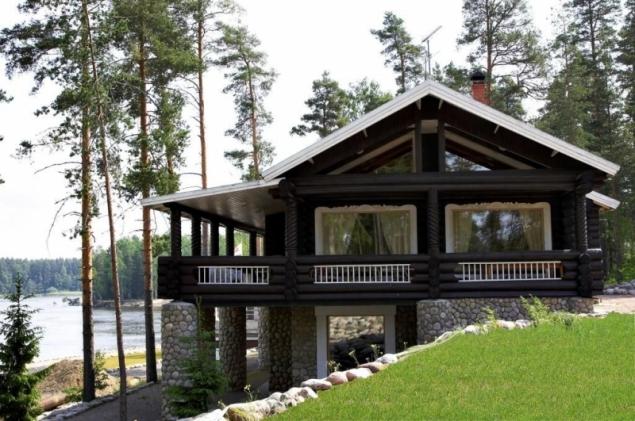
7. Presentation about fertilizers, green manures and even the production of compost, in cases where not enough manure:
From the source:
"Manure can also be made from straw, bagasse and chaff where cattle a little. In the same way to scatter straw, ocasi, chaff on a dirt road, in the yard or in dirty wells, and when this is all topchetsya fifteen days, rain and water saturated, in a big pile to fold, making the top wider, and in the middle of the empty, to keep the rain and any moisture, its pouring, there remained;and when there already during the summer all will uliitsa and rot, to take on the field at that time, which was before described." published
P. S. And remember, only by changing their consumption — together we change the world! ©
Source: vk.com/event136876421?w=wall-136876421_11%2Fall
A few excerpts from the book:
1. Guidelines for choosing locations for settlements:

From the source:
"...various are the signs of life in the place, tells about the uplands and the lowlands and on the composition of the soil, namely: will it bog, calcareous or acidic, or filled with different ores; and the abundance, inadequacy or smallness of the waters, and on the composition of the substances in that water and that from it is born: trees, orchards, springs and other like things that are different to those under the mountains if they have the sea or the large rivers, and if there are low places gullies or some of the stench".
2. Recommendations for the treatment of the terrain:
From the source:
"...every yard ought to put that on your plot have water, and if no nearby water flowing, you should dig a well, and not drying up pond, for a well to the right people, and the pond animals. And how must take care to put the house on the hill with forest and meadow and good to healthy winds, it blew; so you need to consider that the house was open on the Sunny sunrise: summer will be cool in the shade, and in winter, illuminated by the sun.
And happen to put the barn at the river skotinku and other household needs, look diligently, and remember: do not put it close to the water, because the winter is extra cold will be there, and in summer the air is not very healthy, because of the dampness close to the river; provide that wasn't there swamps in the summer because the water dries out of them, and the people of worms, so small that the eye will not see them, but the air in the nose and nostrils of people and cattle puts them, they enter inside, causing diseases, and various ills.
Still need to beware, the house is not put there where there may be strong wind, so it is best in the mountain down to the valley to stake, and not on the mountain itself, not in the valley and certainly not in a dark ravine, but in place of this, where the house blew healthy air and cleans everything so that no trouble; I had rather a place where the sun is all day, because then the worms if they are born and unhealthy dampness spread, the wind will carry them away, and the sun's heat will destroy and dry.
The rain also large, the floods, and harmful to those who put the yards and homes in the valley, and from thieves calmer and safer place is high. Stables and barns oxen and other cattle should be put in the yards to be had in winter they are warm and quiet, and barns to be put on level ground to keep them filled with beer, wine, and oil, and on the shelves of the vegetables and crackers, grain and various seeds and other things which need to be stored for long periods, gradually taking on life.
... Taking into account everything said, you should pick up and place for arable land, so it was close to the court and bring as much profit; and the fields only need to have enough power to plow Yes remove".
Another interesting excerpt on the subject from the source:
"If you want to have a fertile field, give up the flat field, from which the water does not flow, but rather should; but it should not be on too steep a slope to drain everything without leaving the water; nor should it be in the valley (it remains water) and on the hills (to excess winds and heat do not harm her). Between these extremes there is a middle useful, and should be preferred: the field should be spacious and with a slight slope, or hilly in the middle with sloping sides down, so as not to stagnate the air got stale. Or let it be a field on the hill in front of a mountain that protects the earth from strong wind so that the field on the lower mountain was covered with or a steep mountain, or trees. Want to choose the field in the country cold gentle slope it should be against the sun or the South, to those parties not obscured sun or mountain or something like that, why the field such always stood in the shadows. In very hot countries it is better to choose the field that lies to the West or North, that is, the sloping part of the shade to protect from the sun; this will be more useful, healthier, and better."

3. Recommendations on socio-economic situation and even the compatibility of the plantings with those of the neighbors:
From the source:
"...in addition to the soil indirectly need four more things to consider, selecting the field — whether she is fertile or completely useless.
Firstly, such land should not harm your enemies, for let it be fruitful, but would not be good, if the foe often spoils her.
Second, that the city was close and you could sell the surplus of their harvest, buy goods necessary to you. Third — if your home is away from the harvest and you can't quickly get there so need to take this field completely useless.
Fourth — between the house and the field need a convenient journey to different converged there roads where you can drive carts (or vessels with water), and that could get you to take things from people passing by.
There is another important thing for business use: see what quality and treatment fields your neighbors, among whom I live, for example, if your neighbor next to me owns an oak forest, know that there is definitely not you'll be able to plant olive trees, because trees have incompatibility: the other one you can't stand, and if there are, then are deflected away from each other. So the border with the neighbor sometimes turns the estate into a barren, especially if you grow it the olive trees and vines, and other plants too."
4. Guidelines for creating hedges,including those living around the orchards, gardens and fields, as well as understanding the necessary balance of moisture and air in soil in regions with abundant rainfall and a large catchment area.
From the source:
"Garden tiny and garden, and hail the fence are different, because someone ditch their ditches, someone is twisting around the fence to the stakes with brushwood, while others will plant around with the thorns of prickly shrubs or other trees by encircling ditches.All this is well guarded by lasagna men and wild beasts, and the excess water drained from neighboring fields and damaging crops, otherwise without these ditches Zapruder there moisture fields, it will no longer draining and staying on the field, the bread will hurt, developing a weed; in gardens it hinders growth, dehydrating and oxidizing a berry that ripens and remains acidic. Ditches are to be dig wider or narrower, depending on how many escapes of water; they are protected from people, from animals, from the harmful cattle. And to make them better in the summer when the water will dry up in the ground and in the ditches, because it can hinder the work: in the month of August, in September or October, when the land is most dry."
5. Advice on finding water:
From the source:
"...who wants to place some water find, get out before sunrise and on the ground legsi, Astelit beard on the ground and looks at the sun and see the light earth, outgoing, twinkling before the eyes, a vapour, like mist or spray of dew, then at least the place was dry, a sure thing, what's under the shallow ground water;
and if someone wanted to know if there is a lot or little water, judge the earth, because the earth is chalky, Yes lime is of a lot of water waste, the sand holds very little water, besides unsweetened, silt and the underlying;
in black soil the same springs and sources of little — and only from moisture that remains after rain and snow, but this water is good; Yes sandy clay silty ground, a lot of water gives the best, on the rocky soil are also good a lot of water, you need to ensure that she didn't run away between the stones in the gap;
on the rocky mountains are in abundance, ice cold and healthy water, on a level with the same field of the heavy water, heat, salty and unusable, and if there good or tasty, you should know that, although she goes under the earth, its beginning is in the mountains, because on a level field, but near the mountains is good water, especially if flowing in the shadows. And indicate water place additional trees and standing puddles, or simply the humidity in the earth and grow there, the alder, poplar, reed or ivy and other that loves the water;
if these symptoms meet, dig in that place a hole as wide as three feet and depth of five."
6. Recommendations of cutting wood:
From the source:
"Tree to build a house you need to cut in November — December or a bit later, but better to damage a month, because about this time the frost out of the tree any excess resin and juices, especially because of the cold air that chill your drives out of the wood inherent warmth to the very root and even in the depths of the earth;young month multiplies all the moisture, and the damage to its diminish."

7. Presentation about fertilizers, green manures and even the production of compost, in cases where not enough manure:
From the source:
"Manure can also be made from straw, bagasse and chaff where cattle a little. In the same way to scatter straw, ocasi, chaff on a dirt road, in the yard or in dirty wells, and when this is all topchetsya fifteen days, rain and water saturated, in a big pile to fold, making the top wider, and in the middle of the empty, to keep the rain and any moisture, its pouring, there remained;and when there already during the summer all will uliitsa and rot, to take on the field at that time, which was before described." published
P. S. And remember, only by changing their consumption — together we change the world! ©
Source: vk.com/event136876421?w=wall-136876421_11%2Fall
